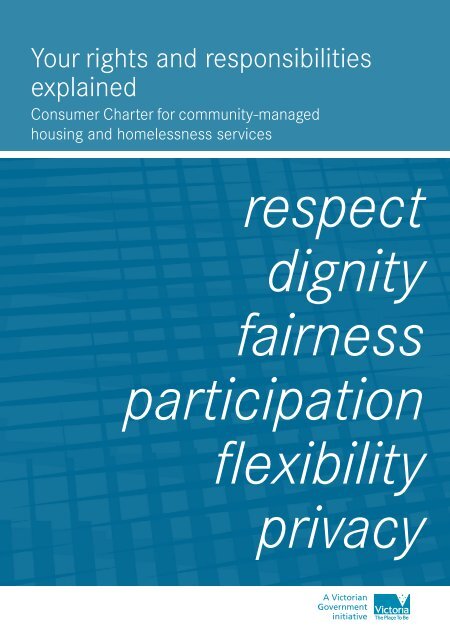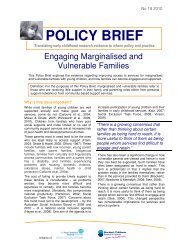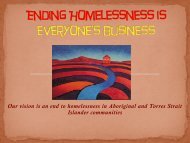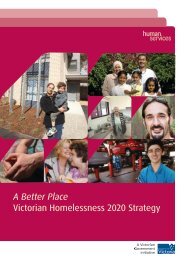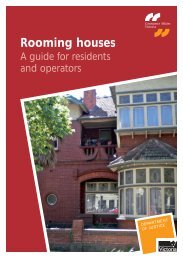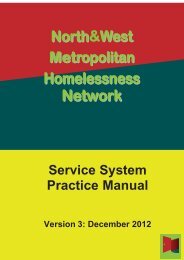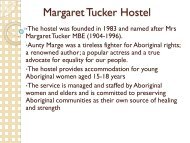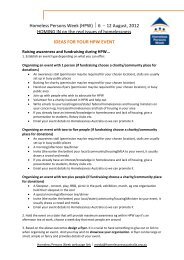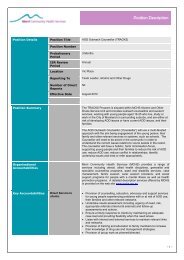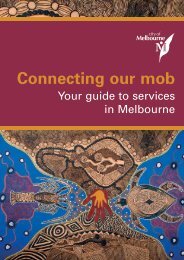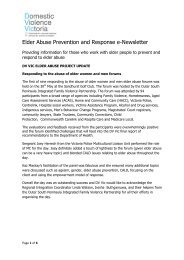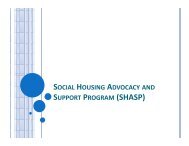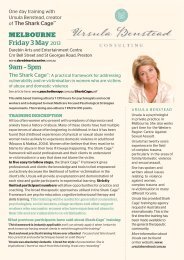Consumer Charter - Department of Human Services
Consumer Charter - Department of Human Services
Consumer Charter - Department of Human Services
- No tags were found...
Create successful ePaper yourself
Turn your PDF publications into a flip-book with our unique Google optimized e-Paper software.
Your rights and responsibilitiesexplained<strong>Consumer</strong> <strong>Charter</strong> for community-managedhousing and homelessness servicesrespectdignityfairnessparticipationflexibilityprivacy
Your rights and responsibilities explained 1Your rights and responsibilitiesexplainedWhen you are seeking support fromany community-managed housing orhomelessness assistance service youhave certain rights and responsibilities.This <strong>Consumer</strong> <strong>Charter</strong> sets out thoserights and responsibilities so they areclear to both you and the service provider.
2 Your rights and responsibilities explainedForewordThe Bracks Government believes all Victorians deserve access to adequate shelter andsupport. We are committed to improving access to housing and making sure that peopleget support when they face difficult circumstances.When people contact a service for assistance at difficult times in their lives, they should betreated fairly, with dignity and respect. To help us understand their needs and develop betterservices, we have consulted with people who have been homeless.This <strong>Charter</strong> is designed to help people accessing services and the organisations providingthose services by clearly explaining consumers’ rights and responsibilities.I thank the many people who contributed to the preparation <strong>of</strong> this <strong>Charter</strong>, in particular thePeer Education Support Team and the people who generously shared their first-handexperiences <strong>of</strong> being homeless. Their knowledge and insights have been extremely valuable.The development <strong>of</strong> the <strong>Consumer</strong> <strong>Charter</strong> is an important step in creating a betterVictoriafor the people and families needing support at critical times in their lives. I am very pleasedto support this <strong>Charter</strong>.Candy Broad MLCMinister for Housing
Your rights and responsibilities explained 3About this <strong>Charter</strong>This <strong>Consumer</strong> <strong>Charter</strong> is for people seeking or receiving assistance from any Victoriancommunity-managed homelessness assistance or social housing service.It is designed to help individuals and organisations understand their rights and obligations.This <strong>Charter</strong> outlines your basic rights and responsibilities, including what you can expect fromthe organisations providing assistance to you, as well as what you need to do to help organisationsprovide the right assistance to you.It also includes information about what to do if you have a complaint.You can expect the organisations you are dealing with to:• uphold your rights, as listed in this <strong>Charter</strong>• run their organisations and provide you with services based on this <strong>Charter</strong>, as well as on theHomelessness Assistance Service Standards or the National Community Housing Standards• be accountable to you, the community and the government for the way they run theirorganisations and provide services• tell you your rights and responsibilities as well as how you can make complaints if youfeel you need to.Organisations will expect that you will meet your responsibilities and treat staff and otherservice users with respect and dignity.In Victoria, homelessness assistance and social housing services include:1. Crisis supported accommodation services that provide emergency accommodationand support for short periods <strong>of</strong> time. These include youth refuges and family violencerefuges and other types <strong>of</strong> crisis services.2. Transitional housing services that provide information about housing options andcan refer you to services that are relevant to your needs. They may also be able to <strong>of</strong>ferlimited financial assistance for private rental accommodation or provide transitionalaccommodation and assistance to find long-term housing.3. Homelessness support services that provide support to resolve a housingcrisis and assistance to find long-term housing.4. Community-managed housing providers that <strong>of</strong>fer long-term community-managed housing.
4 Your rights and responsibilities explainedYour rights and responsibilitiesIf you are seeking or receiving homelessness assistance or housing services, you have the right to:• assistance during a crisis or to prevent a crisis• be considered for accommodation and housing, based on fair policies• receive help finding and staying in suitable housing on a long-term basis• feel safe• be free from discrimination• respect for your culture• respect, dignity and privacy• make choices that will affect your future• participate in the decision making process <strong>of</strong> organisations providing services to you• help applying for income support, employment and health services, educational opportunities andother support services• make a complaint or appeal a decision you do not agree with and receive an answer that makessense to you.You also have the responsibility to:• supply the correct and necessary information about yourself and your situation to organisationsproviding services to you• respect the rights <strong>of</strong> others to feel safe• respect the cultural backgrounds and privacy <strong>of</strong> others• treat others with respect and dignity• meet your responsibilities as a tenant.
Your rights and responsibilities explained 5Your rights and responsibilities explained1.You have the right to assistance during a crisis or to prevent a crisisIf you are homeless or at risk <strong>of</strong> becoming homeless, you can expect to receive assistance findingand contacting the services that will help you best.You can expect that:organisations will give you informationabout what they can do for you and whatother relevant organisations can do for youif an organisation cannot assist you,it will help you find the support andservices you needOrganisations should provide the informationas quickly as possible and clearly explain whois eligible and who gets priority if there is awaiting list. Information should be providedin a way that you can easily understand.For example, the organisation may help youmake contact with another organisation or itmight show you how to get to where you needto go or even assist you to travel there.2. You have the right to be considered for accommodation and housing,based on fair policies.Organisations should have policies about fairly allocating beds and accommodation to those peoplemost in need. You can expect a fair and transparent allocation process that considers your particularneeds and follows the policies <strong>of</strong> the organisation.You can expect that:you will be given information about who iseligible for accommodation and who getspriorityyou will be given assistance to understandand complete the housing applicationprocess and make your case understoodThis information should be easy to understandand should include who makes the decisionsand how you will be informed.An organisation should arrange for you to beassisted if you need it. You should have theopportunity to ask any questions and, ifappropriate, visit the property and ask for anyreasonable changes and repairs.It is your responsibility to:supply the correct and necessary informationabout yourself and your situation to theorganisations providing services to youFair access to accommodation and housingrelies on staff making decisions based onaccurate information. It is your responsibilityto provide this.
6 Your rights and responsibilities explained3.You have the right to receive help finding and staying in suitable housingon a long-term basisThis includes advice, information and support to help you find long-term housing that suits you,whatever your particular circumstances are.You can expect that:an organisation will help you explore alloptions for appropriate housingthe assistance you receive will be tailored toyour individual needs and choicesyou will be provided with options to help youmanage and maintain your tenancy that suityour individual needsThis might include public housing, privaterental, moving to a different sized property,moving to another location or makingreasonable changes to your existing property.Assistance you receive might include:• help completing an application forpublic housing• speaking to a real estate agenton your behalf• help arranging income support ornegotiating with Centrelink• referral to an agency that can providemore assistance• support after you have moved tomore independent living• access to financial advice.These might include:• allowing you to make gradual payments<strong>of</strong> overdue rent• making changes to the property becauseyou are frail or have a disability• considering a request to move into a largeror smaller property, if available• negotiating with your landlord, if appropriate.
Your rights and responsibilities explained 7As a tenant, it is your responsibility to:meet your responsibilities as a tenantAll tenants have obligations under theResidential Tenancies Act (1997), includingpaying rent, treating neighbours respectfullyand looking after your home.A full list is available in Renting a home - aguide for tenants and landlords (the red book),which you should be given. You should also beprovided with additional information when yourequest it.If you cannot pay the rent or have anotherproblem, you should contact your housingorganisation quickly to discuss a solution thatsuits your needs and circumstances.4.You have the right to feel safeWhether you are a client <strong>of</strong> a homelessness assistance service, a resident <strong>of</strong> a crisis accommodationservice or a tenant <strong>of</strong> transitional housing or long-term community-managed housing, you can expectthat the organisation assisting you is committed to providing a safe, secure and healthy environment.You can expect that:the organisation will assist you if you areliving in housing or accommodation thatis unsafethe organisation has appropriate safetyprocedures and equipment in placeYou and your children might feel unsafebecause <strong>of</strong> the facilities or because <strong>of</strong> otherpeople. Staff <strong>of</strong> any organisation should eitherbe able to arrange to get you assistance or findthe best organisation to assist you.Procedures and equipment could include:• fire safety• safe travel• safe storage <strong>of</strong> medications and chemicals• infectious diseases control• hygiene• storage and handling <strong>of</strong> food• keeping premises, cash and valuables safe.
8 Your rights and responsibilities explainedthe organisation tries to prevent you sufferingany harm or abusean organisation’s clients are consulted andparticipate in the development <strong>of</strong> a list<strong>of</strong> rights and responsibilities for thatorganisation to ensure they are reasonableFor example, the organisation should organisefire drills so you know what to do if there isa fire. It should also make sure staff haveappropriate training, such as first aid,managing difficult behaviour, drug andalcohol and mental health awareness, foodhandling and so on.In addition to this <strong>Charter</strong> and to meet andbalance the needs <strong>of</strong> people, organisationsmay develop a list <strong>of</strong> rights and responsibilitiesin consultation with consumers. You have theright to be involved in this process, when itoccurs.There might also be times when anorganisation needs to negotiate some specificrights and responsibilities with an individual,to help them and other people feel safe andsecure. The individual can expect to beinvolved in this process.the organisation has fair and effective ways <strong>of</strong>handling aggressive or potentially violentbehaviourOrganisations have policies on managingaggressive and violent behaviour. Thesepolicies should be made available to you andexplained if you want further information.It is your responsibility to:respect the rights <strong>of</strong> other people to feel safeYou are responsible for ensuring that youractions do not make others feel unsafe.In addition to this <strong>Charter</strong>, some organisationshave policies on rights and responsibilities thatprotect the rights <strong>of</strong> all people to feel safe.These policies should be made available andexplained to you. You must respect and adhereto these policies.
Your rights and responsibilities explained 95. You have the right to be free from discriminationWhen accessing a homelessness assistance or community housing organisation, you should not bediscriminated against by that organisation on any <strong>of</strong> the grounds identified in the Equal OpportunityAct (1995). These include race, gender identity, age, disability, marital status, political or religiousbeliefs, pregnancy, sex, sexual orientation, parental/carer status and physical features.You can expect that:you will be given information aboutyour rightsyou will be assisted if you feel you havebeen discriminated againstOrganisations should provide informationabout this <strong>Charter</strong> to you when you firstcontact them. They may also provide otherinformation about your rights. Whereverpossible, the organisation should try toprovide information to you in a way you canunderstand.This might include discussing rights andresponsibilities with you when you firstsign-up for the service and holding meetingswith all clients from time to time. It may alsoinvolve providing information about advocacyservices (that is, someone who can speakon your behalf).
10 Your rights and responsibilities explained6.You have the right to respect for your cultureYou can expect the organisation to provide services that are sensitive to identity, heritage and lifeexperience. This includes respect for your age, gender identity, religion, race, language, countryand culture <strong>of</strong> origin and for your important relationships and networks.You can expect that:staff will appreciate and be responsive to theuniqueness <strong>of</strong> Indigenous culture by adaptingthe services they provide to suit individualcircumstancesstaff have a good knowledge <strong>of</strong> the socialand cultural groups who are likely to accesstheir serviceeven if an organisation finds it difficult torespond to your needs in practical ways,all staff are sensitive to and respectful <strong>of</strong>your cultureOrganisations will be responsive to the needs<strong>of</strong> Indigenous service users and provideassistance in finding Indigenous-specificsupport services, where appropriate.Organisations should make an effort to ask youabout your specific cultural needs andpreferences and do what they can to supportyou. For example, staff working with peoplewho have experienced torture should havedeveloped specialised skills to provide servicesthat are sensitive to the needs <strong>of</strong> these people.For instance, providing information in everylanguage can be difficult to arrange, however,staff should know how to contact interpretersor other organisations that could help, and theyshould do this as quickly as possible.It is your responsibility to:respect the cultural backgrounds <strong>of</strong> other people
Your rights and responsibilities explained 117. You have the right to respect, dignity and privacyYou can expect to be treated respectfully in a way that promotes dignity and protects your privacy.This includes being spoken to with courtesy, in a non-judgemental manner, and being made to feelwelcome. Privacy includes that <strong>of</strong> your body, home and belongings, and <strong>of</strong> mail and other personalcommunication and information.You can expect that:an organisation should have ethicalguidelinesyou will receive assistance, information oradvice if you are not being treated withdignity and respect by other organisationsor members <strong>of</strong> the publicthe organisation follows the requirements<strong>of</strong> privacy legislation and there are guidelinesto make sure the privacy and dignity <strong>of</strong>consumers and staff are respectedThese should be made available to you andshould include a procedure if you have anycomplaints.Staff should be able to provide you withinformation about the support and advocacyavailable to help you to address these issues.If they cannot provide these servicesthemselves, they should support you toaccess other services.The organisation’s policies and procedureson privacy should be available. Organisationsshould make sure that:• private spaces are provided for personalinterviews and for telephone conversationsand interviews• you have private sleeping arrangements,where possible, and somewhere to keepyour personal property safe• you are given access to your informationfile if you ask• you are only asked to providenecessary information• you are informed about how yourinformation will be used and asked foryour consent before this information isgiven to other people• if your information is being given forpurposes such as reports or research, yourpersonal information cannot be identifiedwithout your consent.
12 Your rights and responsibilities explainedIt is your responsibility to:treat others with respect and dignity andrespect their privacyYou are responsible for respecting otherpeople and their privacy. This includesrespecting others when sharing communalareas, not tampering with mail and notproviding personal details on people toanybody without their consent.8. You have the right to make choices that will affect your futureTo do this properly, you need to be fully informed <strong>of</strong> the options you can choose from and thepossible consequences <strong>of</strong> those options. You can expect that your needs will be responded to ina flexible way that recognises your choices, skills and strengths and aims for long term solutions.You can expect that:you will be supported to make your owndecisions about the services you access andany plans the organisation develops with youif you choose an option that is likely to putyourself or someone else at risk <strong>of</strong> harm orinjury, an organisation might need to takesome actionStaff will provide you with the support andinformation you need to make decisions.This includes advice on the possibleconsequences <strong>of</strong> your decisions. All decisionshave consequences and it is important to bewell informed.Organisations have a duty <strong>of</strong> care to you, totheir other clients (including children) and tostaff and volunteers. This may mean that theycannot support a choice you make or an actionyou take because they must protect others.It is your responsibility to:supply the correct and necessary informationabout yourself and your situation toorganisations providing services to youStaff need to make decisions based onaccurate information to ensure they providethe right service to you.
Your rights and responsibilities explained 139.You have the right to participate in the decision making process<strong>of</strong> organisations providing services to youYou are entitled to be given the opportunity to contribute your views about the way servicesare provided and the way the organisation is managed.You can expect that:you are informed about and givenopportunities to contribute to theorganisation’s decision making activitiesif you are interestedOptions for participating in decision makingmight include:• filling out a feedback sheet or questionnaire• being a member <strong>of</strong> a working party or group• attending house meetings or focus groups• attending events such as barbecues ormorning teas arranged to hear your views• being given information about opportunitiesto participate in consumer groups andmovements.
14 Your rights and responsibilities explained10. You have the right to help in applying for income support, employment andhealth services, educational opportunities and other support servicesTo find and maintain suitable housing, you may require a range <strong>of</strong> assistance and services.If community housing and homelessness organisations do not provide these services themselves,you can expect them to provide information, advice and assistance about how to access theservices you require.You can expect that:if you are finding it difficult tomanage because <strong>of</strong> health problems,organisations will support you t<strong>of</strong>ind the assistance you requireon request, you will be giveninformation about:• income support options• specialist job search programs andplacement agencies• education opportunitiesThis might include finding services thatprovide:• assistance with preparing meals• assistance with taking medication, caringfor yourself at home or home nursing• assistance with arranging home visitsby doctors• assistance with transport to appointments.This might include information about:• rent subsidies or other Centrelink orVeterans Affairs payments• Job Network agencies, and Jobs PlacementEmployment and Training agencies foryoung people• schools, apprenticeships, traineeships,TAFE and university courses• community classes and support groups.
Your rights and responsibilities explained 1511. You have the right to make a complaint or appeal a decision you do not agreewith and to receive an answer that makes sense to youIf you feel the rights listed in this <strong>Charter</strong> have been breached by the organisation or that a decisionis unfair, you should be able to deal with the issue through a process that is fair and aims to reach aresolution as quickly as possible. You can expect that an issue, complaint or appeal will be addressedpromptly, respectfully and fairly.You can expect that:you are given adequate information about theeasiest way for you to raise issues, make acomplaint or appeal a decisionyou are entitled to have an advocate (that is,a person to speak on your behalf) and begiven information about advocacy servicesthe organisation welcomes complaintsand appeals as an opportunity to improvetheir serviceWhen you contact the organisation aboutyour complaint you will be advised:• how to raise your issue• who will manage the issue• the steps involved in the process• how long you can expect it to take.The organisation should support you tohave someone <strong>of</strong> your choice assisting youthroughout the complaints or appeals process,if you wish. The organisation should alsoprovide you with accurate information aboutadvocacy services.You should be able to raise an issuewithout feeling uncomfortable. Some thingsare outside an organisation’s control andyou should be provided with informationabout other ways to raise issues or makea complaint.
16 Your rights and responsibilities explainedWhat to do if you don’t think your rightshave been met1. Raise the issue with the organisation. If you don’t think your rights have been met or youdisagree with a decision, talk to the organisation’s staff first. Tell staff your concerns and ask themto explain why a decision has been made. Organisations should welcome your feedback as anopportunity to review their service.If you don’t agree with, or are not satisfied with, an organisation’s explanation, ask how you canmake an <strong>of</strong>ficial complaint or appeal.2. Contact the Homelessness Advocacy Service. If you are currently seeking or getting help from ahomelessness service or community-managed rooming house, you can contact the HomelessnessAdvocacy Service for advice on 1800 066 256 or at www.chp.org.au/has3. Contact your local Social Housing Advocacy and Support Provider. If you are currently living incommunity housing, you can contact your local Social Housing Advocacy and Support Provider.To find your local service, contact a housing <strong>of</strong>fice or call the Office <strong>of</strong> Housing on 1800 068 860.4. Contact your local Office <strong>of</strong> Housing and ask for information about how to get your complaintheard and dealt with.5. Contact the <strong>Department</strong> <strong>of</strong> <strong>Human</strong> <strong>Services</strong> Corporate Complaints Unit on 1300 884 706.You could also contact the following organisations for help:The Ombudsman VictoriaTelephone: (03) 9613 6222Toll Free (non-metropolitan callers): 1800 806 314Website: www.ombudsman.vic.gov.auEqual Opportunity Commission VictoriaTelephone: (03) 9281 7111Toll Free: 1800 134 142TTY: (03) 9281 7110Website:www.equalopportunitycommission.vic.gov.auPrivacy VictoriaTelephone: 1300 666 445Email: enquiries@privacy.vic.gov.auVITS LanguageLinkTelephone: (03) 9280 1955Website: www.vits.com.au(for assistance with interpreting and translations)<strong>Consumer</strong> Affairs HelplineTelephone: 1300 55 81 81
© <strong>Department</strong> <strong>of</strong> <strong>Human</strong> <strong>Services</strong> 2006Authorised by Peter Allen<strong>Department</strong> <strong>of</strong> <strong>Human</strong> <strong>Services</strong>, 50 Lonsdale St, MelbournePrinted by Impact Printing, 69-79 Fallon St, Brunswick(0161105) June 2006


